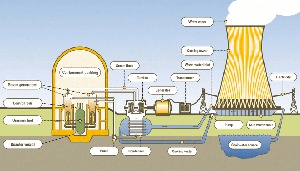 Dr Sogbadji claims nuclear energy though expensive to establish will provide cheap power to consumer
Dr Sogbadji claims nuclear energy though expensive to establish will provide cheap power to consumer
Nuclear energy is slowly emerging is the preferred choice of energy source for many African countries, including Ghana.
This comes as a result of the search for a source of energy that is above everything else, environmentally friendly and cost efficient to countries on the continent, most of whom are struggling to meet the Sustainable Development Goals.
With the government of Ghana’s plan to construct a factory each in the 254 districts nationwide, nuclear energy becomes a no-brainer. This is because factories consume large amount of power from the national grid, and is partially the cause of “dumsor”.
The Ministry of Energy forecasts that traditional energy generation resources – gas, petroleum and hydro-fired plants – will be inadequate, making nuclear the first point of call.
One nuclear power plant is capable of producing about 1,200 megawatts (MW) of power – slightly above a quarter of the national installed capacity of 4,674MW.
In an interview with the Deputy Director of Nuclear and Alternative Energy at the Ministry of Energy, Dr Robert Sogbadji, he explained why Ghana should be interested in Nuclear Energy.
“According to our gas master plan, our gas resources will be dwindling by 2027. We have exhausted our large hydros. Our mini hydros will only give us up to about 200MW to 300MW. Solar is intermittent supply and so it has its role to play."
“However, for industrialisation, we actually need baseload generation such as nuclear, coal and gas base loads,” he said.
Although gas base loads look tenable if we discover gas in the Voltain basin, he said it was only “based on hope,” making it unreliable
Mr Sogbadji added that “Beyond being a sustainable alternative, Dr Sogbadji, who is also the Coordinator of the Ghana Nuclear programme, said the country’s interest in nuclear energy is also bolstered by its environmentally-friendly and cost-efficient nature. As a result, the ministry is working hard to seal a good deal on nuclear power soon to help make energy sustainable”.
On the issue of coal-fired power plants another alternative, experts say it emits large quantities of mercury, sulphur dioxide, nitrogen oxide and lead, which are dangerous to humans, other living things and the environment in general.
Ghana-Russia Nuclear corporations
Since the 1960s, Russia has been a key ally to Ghana’s nuclear power agenda. It was the vending country that advised the Kwame Nkrumah administration on the country’s nuclear power programme, which was thwarted in 1966 when his government was overthrown.
Russian state-owned energy firm, Rosatom has continued the trend in recent years, in its numerous corporations with Ghana.